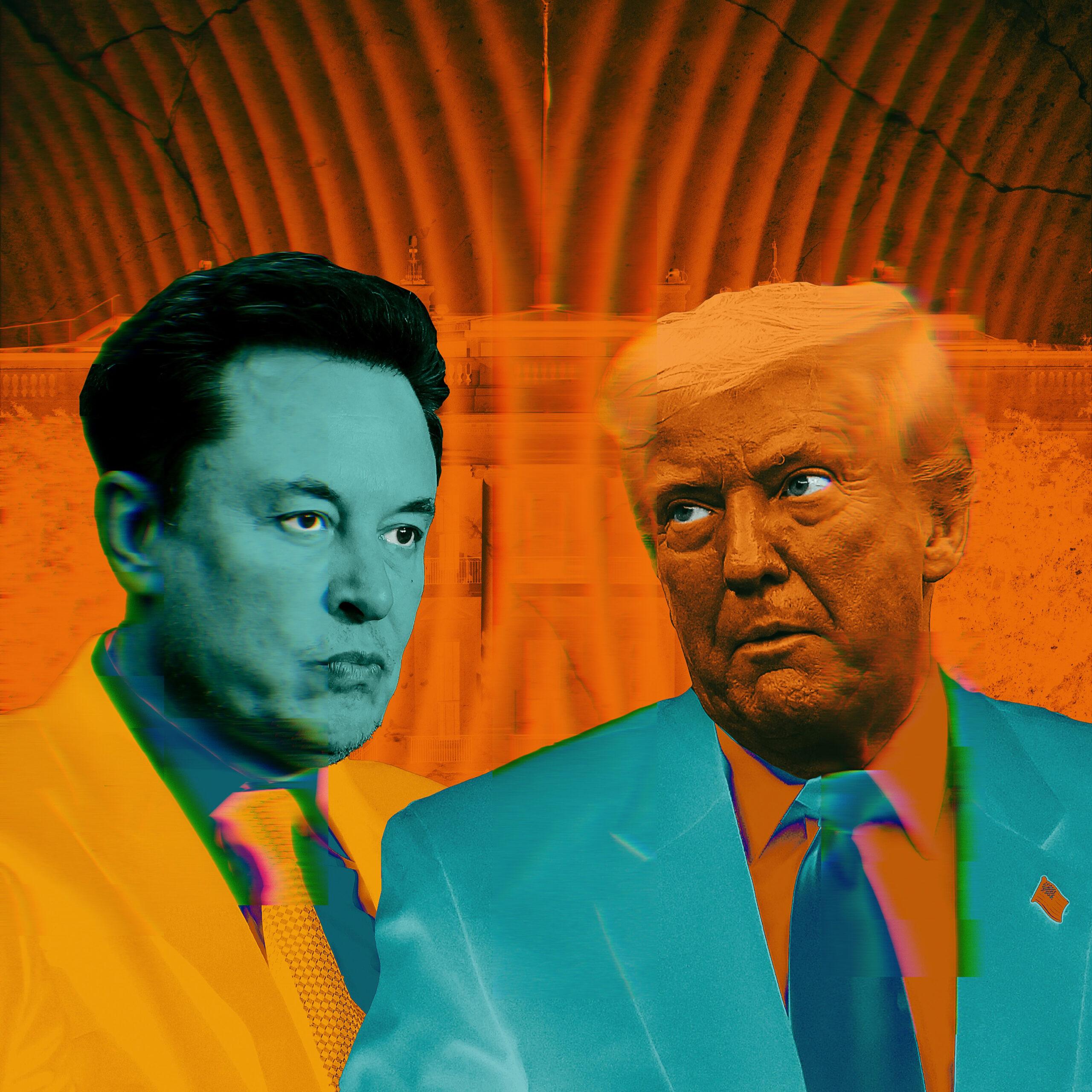
There will, in the next few weeks, be plenty of postmortems published about the political partnership of Donald Trump and Elon Musk. Tea will spill, with administration officials and other insiders going on background with reporters to air grievances in every which direction. All this venting will breathe new life, with new details, into old stories, such as Secretary of State Marco Rubio reportedly shouting down Musk at a Cabinet meeting in March. Give it nine months, and this intrigue will be packed into a buzzy, co-bylined, bestselling Beltway tell-all titled … I don’t know … Meltdown. (Trump will be glowering, lit like he’s staring down a flashlight in a power outage, on the cover.) There will be scoops.
That said, Trump and Musk aren’t giving us much of a mystery to solve. “The most plugged-in people in Washington are reading the same tweets you are, marveling,” Ben Smith writes at Semafor.
This bromance was extremely, obviously doomed from the start. It began—publicly, at least—with Musk hyping up Trump on X after the former president survived an assassination attempt in Butler, Pennsylvania. It then culminated with Trump hosting Musk, as de facto director of the Department of Government Efficiency, in a strange sort of plutocratic residency in the Oval Office. For several months, Trump and Musk were an unbeatable pair, instilling a mix of terror and helplessness in congressional Democrats, at least until a couple of weeks ago, when Musk announced that he’d be stepping away from DOGE.
The Trump-Musk partnership—a thorough repudiation of the old alliance between political progressives and Silicon Valley—then blew up spectacularly this week with Musk assailing Trump’s omnibus spending package—the One Big Beautiful Bill. Musk is furthermore threatening to punish the legislation’s GOP supporters in Congress with challenges in the 2026 midterms. Musk says he’s furious about the fiscal impact; the Congressional Budget Office estimates that the One Big Beautiful Bill would grow the federal deficit by $2.4 trillion over the next decade. Trump, defending the One Big Beautiful Bill as the supposed capstone of his second-term agenda, says that Musk wore out his welcome at the White House and revolted against the bill only because it discontinued tax credits for electric vehicles. Trump is bullshitting here, I think; Musk previously expressed support for Trump’s proposals to drastically roll back the tax credits for EVs, and while he’s changed his tune in recent weeks, Musk does seem genuinely—dogmatically, flamboyantly—obsessed with cost cutting. This really does seem to be a good ol’-fashioned clash of egos, exacerbated by the typical coalitional awkwardness of this political age.
There’s a fundamental fissure in Trumpworld between the gilded techno-optimists, led by Musk, and the more … let’s say … disheveled populists, such as Steve Bannon, who is currently pressing his former boss to have Musk sent back to his native South Africa. “They should initiate a formal investigation of his immigration status because I am of the strong belief that he is an illegal alien, and he should be deported from the country immediately,” Bannon told The New York Times.
This week, Musk didn’t simply break with Trump—he spited him. “Without me,” Musk tweeted, “Trump would have lost the election, Dems would control the House and the Republicans would be 51-49 in the Senate.” Setting aside the fact value of that statement from Musk—I think it’s obviously false—it’s a wildly entitled and predictably counterproductive thing for him to say to Trump. It’s so perfectly representative of the problem with Musk’s recent approach to politics, in general. There’s the question of Musk’s problems with the One Big Beautiful Bill. And then there’s the broader and, to my mind, more pressing question: Why are Musk and his ilk so dramatically bad at politics?
There’s a certain mercurial idiocy to how Silicon Valley has played the politics of the past decade. Its emergent style of politics is weirdly sloppy, hotheaded, and vindictive. These guys watched Mark Zuckerberg get bodied by lawmakers and journalists for years, in hearing after hearing, in exposé after exposé, and they grew to resent that the tech industry was being written into a partisan lose-lose by people who, in their view, fundamentally misunderstand their industry and its products. They watched Sheryl Sandberg, with her conventional lobbying of Barack Obama and congressional Dems, ultimately leave Meta with little to show for it outside of Zuck occasionally wearing a suit.
Years ago, I listened to the influential tech entrepreneur Balaji Srinivasan, in an interview with the Fifth Column podcast, outline a theory of tech-minded people and politics-minded people having fundamentally different—and conflicting—approaches to problem-solving. Nate Silver also frequently talks about this in his somewhat annoyingly poker-inflected theory of Riverians and Villagers, which characterizes the former as risk-takers and capitalists and the latter as the liberal establishment that values social equity. There’s a hint of mutual humility in this thesis: As much as the politics people might not adequately understand tech, the tech people might not adequately understand politics. What began as an understandable urge on the tech side to get more proactively and productively involved in politics, though, has quickly become an ugly series of craven reversals and hysterical overcorrections that make a certain short-term sense but seem absurdly counterproductive once you game them out over a decade, when, sooner or later, the tech companies will have to deal with (1) the Democrats and (2) the political discomfort caused by innovations as potentially transformative as artificial general intelligence. You can deflect questions about wide-scale job losses across every other profession for only so long.
In the short term, Joe Biden wouldn’t give these guys what they wanted—free rein on crypto and AI—but Trump would. That would explain Musk and Marc Andreessen calmly endorsing Trump and methodically shifting their campaign donations from Democrats to the GOP over several election cycles. But it hardly explains these guys burning every bridge and transforming into frothing ideologues. It also hardly explains the conspicuous reluctance to sincerely counter many of the supposed misconceptions about a lot of this tech. Silicon Valley could’ve tried to reposition cryptocurrency as a tool for something other than drug trafficking and get-rich-quick schemes, but instead these guys seemed to think, Let’s pitch it to Trump, who loves get-rich-quick schemes and might be persuaded to ignore all the drug trafficking. Silicon Valley could’ve tried to assuage concerns about AI potentially putting half the country out of work, but instead many of these guys concede the potential downsides but nevertheless balk at the idea of anyone with any political responsibility doing anything to mitigate them. These are the instincts of people who primarily experience “disruption” as self-enrichment, who experience politics as forum drama.
The Trump-Musk blowup coincides so perfectly with the release last weekend of Jesse Armstrong’s tech-bro movie satire, Mountainhead, about a bunch of bratty founders whose reflexive response to receiving some situationally appropriate political scrutiny is to spite the E.U. with brownouts and to sponsor a coup in Argentina. Mountainhead can feel a little too facile and circle jerky as a satire, in parts, but Armstrong certainly nailed the petulant incoherence of this peer group, morally and politically. Ultimately, Musk, Andreessen, Peter Thiel, and Co.—the subjects of the caricatures in Mountainhead—aren’t entirely representative of Silicon Valley, still a relatively progressive construct overall. But they are an influential faction united as much by techno-libertarianism or “classical liberalism” or whatever as they are by a penchant for political malpractice. The result is Musk vaporizing his clout with either party for unclear reasons, to unspecified ends. It couldn’t be clearer that this guy, who just a couple of months ago blew $25 million on a judicial race for the Wisconsin Supreme Court, almost certainly learned everything he knows about U.S. politics on the toilet, from 4chan, r/KotakuInAction, and his own ghettoization of Twitter.
Musk, as of this morning, is seemingly trying to de-escalate his war of words with Trump, less than 24 hours after more or less calling the president a pedophile, or at least an associate of one. A smarter operator might have led with such restraint—alas. Who knows how long any truce between these two knuckleheads will hold; Trump recently said, in remarks about Iran, that he’s never believed in having permanent enemies, but then, there he is in the Oval Office, after all these years, still beefing with Rosie O’Donnell. Silicon Valley and MAGA still have a couple of years of crypto galas and AI summits ahead of them. For now, at least, Musk is leaving Washington, cutting his political contributions, “back to spending 24/7” at X, Tesla, SpaceX, etc. Did Musk learn anything in his aimlessly destructive romp through the federal bureaucracy? Likely not, as he and his loudest allies seem deathly allergic to knowing what they don’t know. As programmers, at least, they might have sensibly applied one cross-disciplinary insight to their efforts at political influence: garbage in, garbage out.



